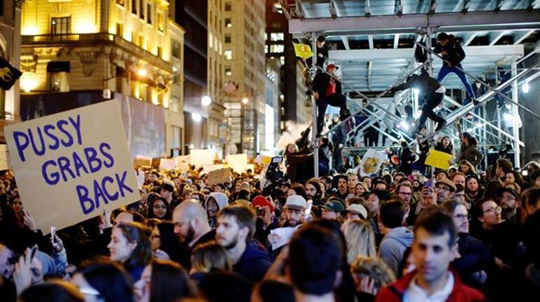New York, Nov 10: Hundreds of thousands of people took to the streets across the US to protest against Donald Trump's victory in the presidential polls, slamming him for his bigotry and racism, as they demonstrated against his electoral pronouncements on immigration and Muslims.

People from all ages, faiths and nationalities assembled at landmark locations in New York, Chicago, Philadelphia, Boston, California, Colorado, Seattle and other cities protesting against Trump, barely a day after he registered a stunning presidential victory against Hillary Clinton.
The protesters were seen walking on roads and highways between moving traffic, holding a multitude of placards and expressing their resentment for Trump through slogans such as 'No more Hate' and 'Trump is not our President'.
In New York, protesters walked about 40 streets from 14th Street to Fifth Avenue, where Trump's campaign headquarters The Trump Towers is located. Streets surrounding the towers were completely shut off due to the protests.
Kelly Lopez, a young Latino said, she has been upset since morning when it was clear that Trump will be the next US President. She said a person who throughout his campaign has resorted to racism, bigotry, fascism and insulting women and minorities, cannot change overnight and say that he will work for all American people.
"You have bases your entire electoral race on bringing down people, you cannot suddenly change that," she said.
John Jacob, referring to Trump's victory speech, said he does not trust Trump when he said he will "bind the wounds of division".

"How does he take back everything he said in his campaign and the debates," Jacob said, adding that Trump does not have the experience or the intelligence of Clinton.
A young African American student Elaz Iben said Trump will be president of the country for the next four years and "while I will respect the institution of the presidency, I will also respect my right to protest."
The protests in the city as well as across other parts of the country were organised by a group called Socialist Alternative.
"The victory of Donald Trump is being met with shock, fear, and anger. Especially for immigrants, Muslims, people of color, women, and other oppressed people who Trump has singled out for attack, the question of how to defend themselves against the coming attacks is sharply posed," the group said.
It urged people to come together and demonstrate their "mass opposition" to Trump. "Build a wall around Trump's bigoted agenda," the group said on its Facebook page.
The group said the protests must be the beginning of "coordinated nationwide mobilisations to organise millions into a massive grassroots movement."








Comments
Add new comment